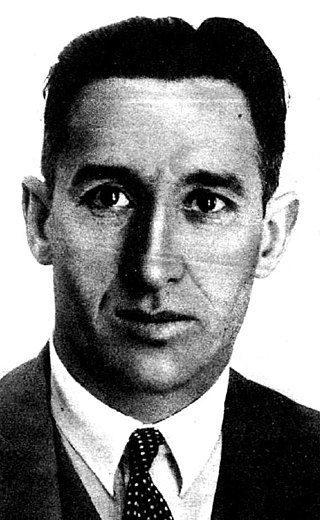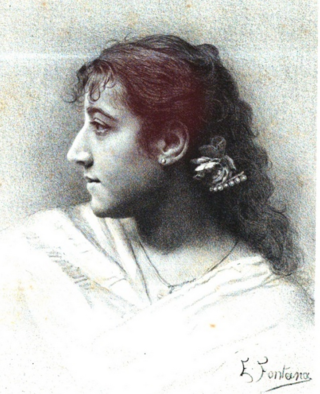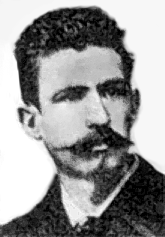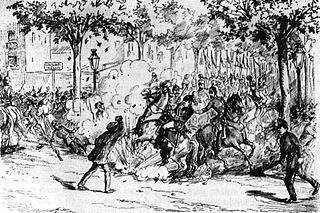
Lluís Companys i Jover was a Catalan politician who served as president of Catalonia from 1934 and during the Spanish Civil War.
Anarchism and violence have been linked together by events in anarchist history such as violent revolution, terrorism, and assassination attempts. Leading late 19th century anarchists espoused propaganda by deed, or attentáts, and was associated with a number of incidents of political violence. Anarchist thought, however, is quite diverse on the question of violence. Where some anarchists have opposed coercive means on the basis of coherence, others have supported acts of violent revolution as a path toward anarchy. Anarcho-pacifism is a school of thought within anarchism which rejects all violence.

The Gran Teatre del Liceu, or simply Liceu, is a theater in Barcelona, Spain. Situated on La Rambla, it is the city's oldest theater building still in use for its original purpose.

Ángel Pestaña Nuñez (1886–1937) was a Spanish anarcho-syndicalist general secretary of the Confederación Nacional del Trabajo (CNT), founder of the Syndicalist Party and member of the Cortes Generales.

The Mercat de Sant Josep de la Boqueria, usually simply referred to as La Boqueria, is a large public market in the Ciutat Vella district of Barcelona, Catalonia, Spain, and one of the city's foremost tourist landmarks, with an entrance from La Rambla, not far from the Liceu, Barcelona's opera house. The market has a very diverse selection of goods.

The Orsini bomb was a terrorist improvised explosive device built by and named after Felice Orsini and used as a hand grenade on 14 January 1858 in an unsuccessful attack on Napoleon III. The weapons were somewhat commonly used during a wave of militant anarchist violence in the latter half of the 19th century in Europe, and surplus bombs were also used by the Confederacy during the American Civil War. The design is reminiscent of modern impact fused grenades, such as the Soviet RGO hand grenades. Orsini bombs were designed to remove “the uncertainty of slow burning fused weapons".

Lluïsa Casagemas i Coll was a Catalan violinist, singer and composer. She was born in Barcelona and studied composition with Francesc de Paula Sánchez i Gavagnach and violin with Agustí Torelló. She began composing at an early age and made her debut as a composer in 1893 with a symphonic poem.

The July 1936 military uprising in Barcelona was a mutiny that occurred in Barcelona, the capital and largest city of Catalonia, in the Second Spanish Republic from 19 to 21 July 1936. It was one of the main events that marked the start of the Spanish Civil War.
Mariona Rebull is a 1947 Spanish historical drama film directed by José Luis Sáenz de Heredia and starring José María Seoane, Blanca de Silos and Sara Montiel. The film is an adaptation of the 1943 novel of the same title by Ignasi Agustí. The film is set amongst the high society of late nineteenth century Barcelona. Mariona Rebull is unhappily married, and begins an affair. She is eventually killed on 7 November 1893 when an anarchist Santiago Salvador throws a bomb into the stalls of the Gran Teatre del Liceu, Barcelona's opera house. This was based on a real-life incident.

Plaça de Sant Felip Neri is a small square in the Gothic Quarter in the district of Ciutat Vella in Barcelona, Catalonia, Spain. The square takes its name from the Church of Saint Philip Neri, which presides over the square. To the right of the church is the School of Saint Felip Neri which uses the square as a playground. To the left of the church is a house used by the Oratory of Saint Philip Neri. In the centre of the square is an octagonal fountain, dedicated as a symbol of life. The architecture surrounding the square includes buildings of Renaissance and Baroque style.

Joan Montseny i Carret (1864–1942), who also wrote under the pseudonym Federico Urales, was a Catalan anarchist activist and journalist from Spain.

The Montjuïc trial was a trial of anarchist suspects in the military Montjuïc Castle following the 1896 terrorist attack on the Barcelonean Corpus Christi procession. About 400 suspects were arrested, from whom 87 were put on trial and five executed. Stories of forced confessions through torture led to an 1898–1899 campaign for a judicial review of the trial organized through Alejandro Lerroux and his newspaper El Progreso. Republican support for Lerroux from this action led to his rise as a left-wing force in Barcelona.

Virginia Damerini was an Italian opera singer, active in the 1880s and 1890s.

The Black Hand was a presumed secret, anarchist organization based in the Andalusian region of Spain and best known as the perpetrators of murders, arson, and crop fires in the early 1880s. The events associated with the Black Hand took place in 1882 and 1883 amidst class struggle in the Andalusian countryside, the spread of anarcho-communism distinct from collectivist anarchism, and differences between legalists and illegalists in the Federación de Trabajadores de la Región Española.

The 1896 Barcelona Corpus Christi procession bombing was an attack carried out on the Feast of Corpus Christi procession in Barcelona on June 7, 1896. The identity of the perpetrators is disputed: the attack was attributed to anarchists but this was a result of forced confessions through torture.

The Jerez uprising was an 1892 peasant rebellion in Jerez, Spain. While the event itself was unexceptional amid the regional history of rebellions, the disproportionate repression following the uprising resulted in a series of protests and retaliatory bombings throughout the remainder of the decade. The uprising consisted of 500 to 600 fieldworkers who marched into Jerez with their farm equipment and demands of prisoner release and economic relief. They were shut down within hours, leaving three dead. The Spanish Civil Guard detained 315 fieldworkers, anarchists, and labor organizers from the countryside. They focused on quelling anarchism in the region, though the role of anarchism in the uprising itself has been the subject of inconclusive historiographical debate.

Paulí Pallàs was a Spanish anarchist and typesetter who carried out an unsuccessful assassination attempt on Catalan captain general Arsenio Martínez Campos.

On September 24, 1893, the anarchist Paulí Pallàs attempted to assassinate Catalonia Captain General Arsenio Martínez Campos during a military parade in Barcelona. The attackers' two bombs missed their target and only slightly injured the general but seriously injured over a dozen others, with two deaths. The attacker, who did not attempt to flee, was arrested, sentenced to death and executed two weeks later. In his trial, he said he sought to avenge the executions of the anarchists killed following the prior year's Jerez uprising. The attack on Martínez Campos precipitated a series of reprisals that culminated in the assassination of Spanish Prime Minister Cánovas del Castillo in 1897.
Anarchism in El Salvador reached its peak during the labour movement of the 1920s, in which anarcho-syndicalists played a leading role. The movement was subsequently suppressed by the military dictatorship before experiencing a resurgence in the 21st century.
Francisca Saperas Mirò was a Spanish anarchist and anarcho-syndicalist. She was born on 12 February 1851 in Barcelona and died on 21 August 1933. She is known for having sheltered anarchists wanted by the police. Antònia Fontanillas Borràs was her granddaughter.
















